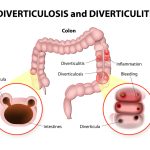Diverticulitis
In this blog, the team at Piedmont Colorectal explores the scenarios when it’s appropriate to treat diverticulitis, helping you understand the signs, symptoms, and the importance of timely medical intervention.
Understanding Diverticulitis
Before we discuss treatment, let’s quickly review what diverticulitis is. Typically forming in the lower part of the large intestine, diverticula are generally harmless. The formation of these pouches is known as diverticulosis. However, if the pouches become inflamed or infected, the condition is known as diverticulitis. Symptoms might include severe abdominal pain, fever, nausea, and a marked change in bowel habits.
Symptoms and Treatments
Mild Symptoms
If you experience mild symptoms of diverticulitis such as slight abdominal pain or bloating, we might recommend switching to a liquid or low-fiber diet temporarily to let your colon rest.
Moderate Symptoms
Symptoms like persistent abdominal pain, fever, and changes in bowel habits suggest a more significant inflammation or infection. In these cases, medical treatment might include:
- Oral Antibiotics: To fight the infection.
- Pain Relief: Medication to manage abdominal pain.
- Dietary Management: Guidance on appropriate foods to eat during recovery.
Severe Symptoms
Severe symptoms such as intense, unrelenting pain, high fever, vomiting, or signs of an abdominal abscess (like a palpable lump) require immediate medical attention. They can indicate a severe complication such as an abscess, perforation, stricture, or narrowing of the intestines.
At this point, treatment might involve:
- Hospitalization: To provide intravenous antibiotics and fluids.
- CT Scans and Tests: To assess the extent of inflammation or check for complications like perforations or abscesses.
- Surgery: In cases of complications such as a ruptured intestine or widespread infection, surgical intervention may be necessary. Our Atlanta colorectal surgeons are specially trained and experienced in procedures to treat the complications of diverticulitis.
When To See a Doctor Immediately
Immediate medical attention is required if you experience:
- Severe abdominal pain
- High fever
- Blood in your stool
- Inability to pass gas or stools
Contact Piedmont Colorectal for More Information
Diverticulitis is a manageable condition with the right care. Recognizing when to seek treatment allows for prompt management of symptoms, helping prevent complications and improving quality of life. If you suspect you have diverticulitis or if you’re experiencing troubling symptoms, don’t hesitate to call (404) 351-7900 to contact Piedmont Colorectal. Remember, early intervention is key to effectively managing and treating diverticulitis.

